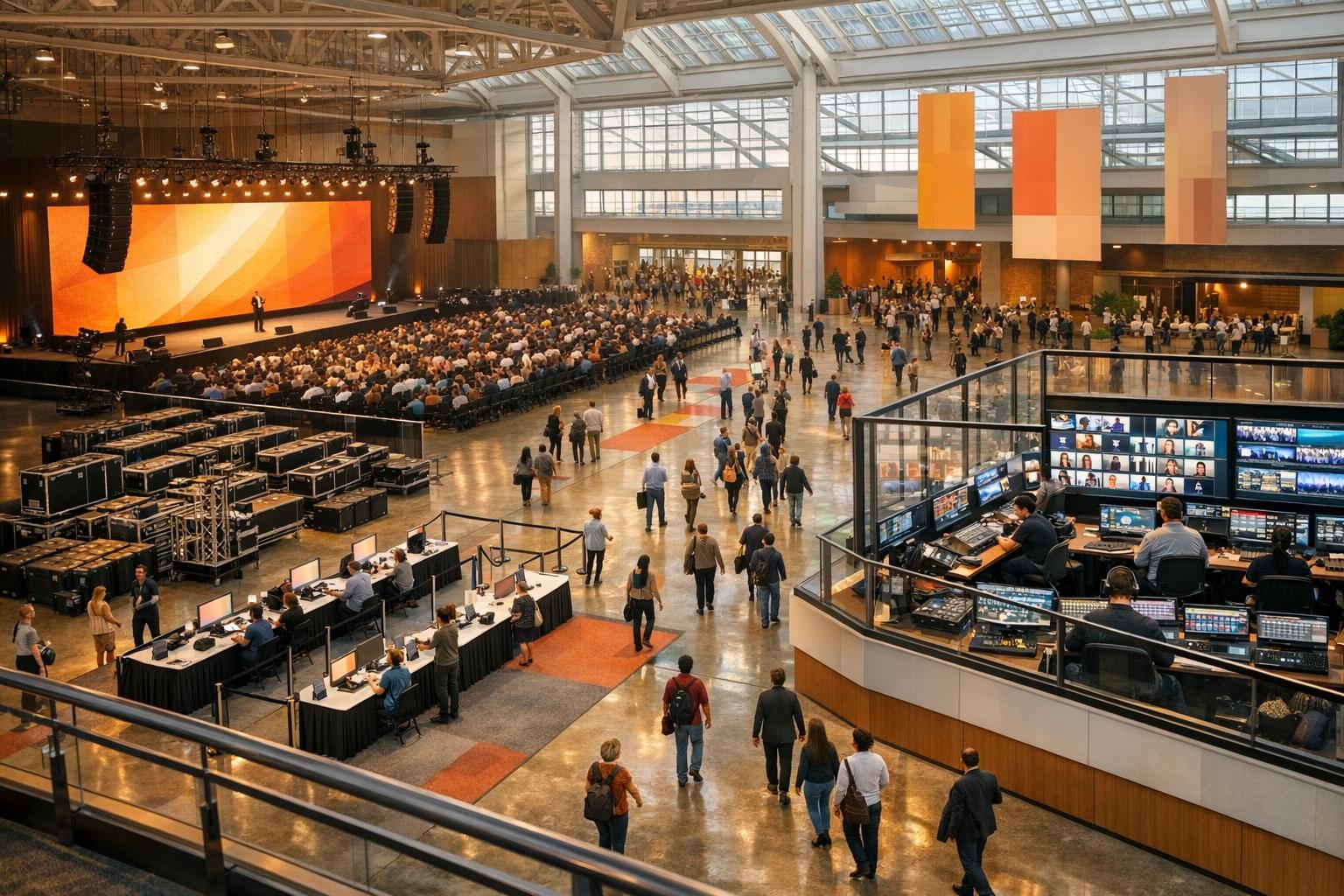Example Agendas Of Successful Franchise Meetings

Chief Executive Officer

A structured agenda can transform franchise meetings into highly productive sessions that drive results. Whether you're hosting annual conventions, regional summits, or training workshops, the key is to plan effectively. Here's what you need to know:
- Purpose of Franchise Meetings: Share knowledge, tackle challenges, and align on goals.
- Types of Meetings: Annual conventions for large-scale updates, regional summits for localized issues, operational reviews for performance analysis, and workshops for hands-on training.
- Agenda Importance: Keeps discussions focused, ensures preparation, and leads to actionable outcomes.
- Key Agenda Components:
- Company Updates: Align on goals and share performance metrics.
- Training Sessions: Equip franchisees with skills in operations, marketing, and finance.
- Workshops: Encourage collaboration and problem-solving.
Quick Tip: Share agendas 3–5 days in advance and document action items clearly to ensure accountability. Meetings that balance presentations with interactive sessions (40% vs. 60%) tend to be more engaging and effective.
Want to create better franchise meetings? Start by focusing on clear objectives, structured agendas, and actionable takeaways.
How to Create a Meeting Agenda for a Small Business | Entrepreneurial Concepts
Key Components of Effective Franchise Meeting Agendas
Creating a solid franchise meeting agenda boils down to three essential components. Research shows that clear agendas can cut meeting time by nearly 29% while driving more actionable results [5]. Each element contributes to the success of your franchise gathering in a unique way.
Company Updates and Vision
Kick off the meeting by ensuring everyone is aligned on shared goals and the company’s direction. This is the time to present performance metrics, market updates, and strategic initiatives in a clear and concise manner.
Set aside time to discuss upcoming developments, like new product launches, service changes, or operational updates. This helps franchisees anticipate what’s ahead and prepare accordingly. Leadership insights are also key - explain the reasoning behind strategic decisions, market positioning, and responses to industry trends, such as regulatory changes or shifts in consumer preferences.
Don’t forget marketing updates. Cover advertising campaigns, promotional strategies, and brand positioning so franchisees understand how national efforts tie into their local operations.
Education and Training Sessions
Invest time in equipping franchisees with the skills they need through focused training sessions on operations, marketing, and financial management.
For operations, this could mean introducing new procedures, updating equipment, or improving efficiency with hands-on demonstrations. Marketing training can provide actionable tips for leveraging both national campaigns and local strategies. Financial management sessions might dive into topics like analyzing financial statements, managing cash flow, or tracking key performance indicators.
To make these sessions more effective, consider dividing participants into breakout groups based on experience level. New franchisees can get foundational guidance, while seasoned operators gain advanced insights. This tailored approach lays the groundwork for interactive problem-solving sessions.
Workshops and Peer Collaboration
Workshops take the learning further by encouraging active participation and collaboration. These sessions turn passive listening into dynamic problem-solving through group discussions and practical exercises.
Small group discussions are particularly helpful for addressing shared challenges, like staffing issues or local competition, allowing franchisees to exchange strategies and adapt solutions to their specific needs. Roundtable sessions are another great format, offering experienced franchisees the chance to share success stories and lessons learned from real-world scenarios.
Interactive exercises, such as role-playing customer service situations, let participants practice new techniques in a supportive environment. Additionally, franchisee-led presentations are becoming more common, offering relatable, real-life examples that resonate with attendees.
Don’t underestimate the value of networking. Informal interactions during coffee breaks, lunches, or evening receptions often lead to meaningful connections and ongoing collaboration.
For time management, a common structure includes 60–90 minutes for company updates, 2–3 hours for training sessions, and 1–2 hours for workshops and peer collaboration. Many franchise conventions stretch over three days to balance these elements while leaving room for networking.
Sample Agendas for Franchise Meetings
Crafting an effective agenda is key to ensuring meetings are engaging and productive. Below are two sample agendas designed to maximize participation and deliver meaningful outcomes. Both examples follow the 4 Ps framework - Purpose, Product, People, and Process - while adhering to smart time management principles.
Single-Day Meeting Agenda Example
This single-day agenda is ideal for quarterly updates or focused training sessions. Running from 8:00 AM to 5:00 PM, it allows franchisees to arrive the evening before and leave the same day, minimizing disruption to their schedules.
Quarterly Business Review Meeting - March 15, 2025
Purpose: Align franchisees on Q1 performance and prepare for spring marketing initiatives.
| Time | Session | Duration | Format |
|---|---|---|---|
| 8:00 AM - 8:30 AM | Registration & Continental Breakfast | 30 min | Networking |
| 8:30 AM - 9:00 AM | Welcome & Company Updates | 30 min | Presentation |
| 9:00 AM - 10:30 AM | Q1 Performance Review & Market Trends | 90 min | Presentation |
| 10:30 AM - 10:45 AM | Coffee Break | 15 min | Networking |
| 10:45 AM - 12:15 PM | Spring Marketing Campaign Workshop | 90 min | Interactive Workshop |
| 12:15 PM - 1:15 PM | Networking Lunch with Roundtables | 60 min | Structured Networking |
| 1:15 PM - 2:45 PM | Franchisee Success Stories | 90 min | Case Studies |
| 2:45 PM - 3:00 PM | Break | 15 min | Networking |
| 3:00 PM - 4:30 PM | Operational Excellence Training | 90 min | Educational Session |
| 4:30 PM - 5:00 PM | Action Items & Next Steps | 30 min | Planning |
This agenda balances presentations (40%) and interactive sessions (60%), scheduling crucial updates early in the day when energy levels are at their peak.
Multi-Day Convention Agenda Example
For deeper engagement and comprehensive training, a multi-day convention format is ideal. This example, inspired by Service Brands International conventions, is structured over a Friday-to-Sunday timeframe to minimize business interruptions.
Annual Franchise Convention - "Driving Growth Together"
October 10-12, 2025 | San Diego, CA
Day 1: Friday – Arrival & Vision Setting
| Time | Session | Format |
|---|---|---|
| 2:00 PM - 6:00 PM | Registration & Check-In | Open Registration |
| 6:00 PM - 7:00 PM | Welcome Reception | Networking |
| 7:00 PM - 8:30 PM | Opening Keynote: "The Future of Our Industry" | General Session |
| 8:30 PM - 10:00 PM | Welcome Dinner | Structured Networking |
Day 2: Saturday – Learning & Strategic Updates
| Time | Session | Format |
|---|---|---|
| 7:30 AM - 8:30 AM | Breakfast Networking | Informal Networking |
| 8:30 AM - 10:00 AM | State of the Company Address | General Session |
| 10:00 AM - 10:30 AM | Coffee Break & Hub Time | Networking |
| 10:30 AM - 12:00 PM | Franchisee Spotlights: "What's Working Now" | Case Studies |
| 12:00 PM - 1:30 PM | Networking Lunch with Small Group Roundtables | Structured Networking |
| 1:30 PM - 3:00 PM | Educational Breakout Sessions (Choose Your Track) | Concurrent Sessions |
| 3:00 PM - 3:30 PM | Coffee Break | Networking |
| 3:30 PM - 5:00 PM | Interactive Workshops: Apply What You Learned | Hands-On Learning |
| 7:00 PM - 10:00 PM | Evening Social Event: Harbor Dinner Cruise | Structured Free Time |
Day 3: Sunday – Application & Future Planning
| Time | Session | Format |
|---|---|---|
| 8:00 AM - 9:00 AM | Breakfast: Peer-to-Peer Networking | Informal Networking |
| 9:00 AM - 10:30 AM | Advanced Strategy Workshops | Interactive Learning |
| 10:30 AM - 11:00 AM | Coffee Break | Networking |
| 11:00 AM - 12:00 PM | Leadership Panel: "Looking Ahead" | Q&A Session |
| 12:00 PM - 1:00 PM | Closing Lunch & Action Planning | Wrap-Up |
This agenda includes "structured free time", such as the Saturday evening dinner cruise, which offers attendees a chance to relax and connect in a more informal setting.
"The two main goals for our event are to get owners excited again about their business and to provide a forum for communication. Franchise conventions are a great way to introduce new programs that help build the brand and their business."
- Kelly Beattie, Director of Training, Service Brands International
The Saturday sessions prioritize strategic updates in the morning, when participants are most attentive, and transition to interactive formats in the afternoon. Sunday is focused on actionable insights and planning, ensuring attendees leave with clear objectives and next steps.
Both agenda examples showcase how thoughtful planning can drive engagement, strengthen franchisee relationships, and deliver key messages in a way that resonates.
sbb-itb-ae35a94
Best Practices for Franchise Meeting Execution
Turning a well-planned agenda into actionable results requires more than just good intentions. The real magic lies in how you prepare your attendees, keep them engaged during the meeting, and ensure follow-through afterward. Here’s how to make every franchise meeting count.
Distributing Agendas and Setting Expectations
Send out agendas 3–5 days before the meeting to give franchisees time to prepare. As Meghan O'Connor from Bishop-McCann points out:
"Once these [objectives] are set, ensure that these goals are communicated to attendees, so they know what to expect from the event".
Work closely with your franchise advisory council when crafting the agenda. Jan Muhleman, President of REGROUP, advises:
"If the council has an elected Chair and Vice Chair, work with them in advance of the meeting to develop the agenda. Make sure they know which decisions need to be made in the meeting and which are for discussion only".
To streamline discussions, create a standardized format for presenting major projects. Include objectives, strategies, target audiences, ROI metrics, costs, and timelines. Framing these within your broader strategic plan helps attendees see how everything connects.
Consider hosting pre-event "Ask Me Anything" sessions. These allow franchisees to ask leadership questions ahead of time, helping to align expectations. A great example of modern agenda distribution comes from Sport Clips Haircuts. At their April 2025 National Huddle with 3,100 attendees, they used a mobile event app to provide instant agenda access, push real-time updates, and connect attendees. This approach not only saved on printing costs but also reduced environmental impact.
Lastly, clarify how attendees prefer to receive information. Muhleman suggests:
"Discuss with the council how they want to receive information, its format, content and frequency. What do they want to receive in advance of the meeting? What will be presented in the meeting? What updates do they wish to receive between meetings?".
Once expectations are set, the focus shifts to creating an engaging experience.
Encouraging Participation and Engagement
Franchisees thrive in interactive sessions, not passive lectures. Aim for the "40:60 rule", where franchisees contribute at least 40% of the discussion time.
Schedule your most critical content between 10:00 AM and 1:30 PM, when attention spans are at their peak. Start sessions with icebreakers or energizing activities to build connections and set a positive tone.
To keep things lively, use live polling tools like Slido or Mentimeter. These tools, already used by over 81.8% of virtual event planners, are excellent for collecting real-time feedback and maintaining engagement. Add gamification elements such as trivia contests, session challenges, or social media competitions with prizes to motivate attendees and create a memorable experience.
Vary your session formats. Keep presentations short - 20 minutes max - and mix in panel discussions, workshops, and breakout groups. Structured networking opportunities, like speed networking or themed roundtables, can also help attendees build valuable connections. In fact, 41% of professionals express a desire for more networking events.
Encourage openness by sharing challenges and inviting input. For hybrid meetings, designate a moderator to monitor chat windows and share virtual participants’ questions with speakers, ensuring everyone feels included.
Documenting Action Items and Following Up
Capture action items during the meeting to avoid losing details. Record key decisions in real time for accuracy.
Use a consistent template to document each action item. Include specifics like task details, responsible parties, deadlines, and priority levels. Store these in a central location, whether it’s a project management tool, a shared cloud document, or your franchise management system.
Send a post-meeting recap within 24–48 hours. This should include a detailed list of action items, assigned responsibilities, and deadlines. At the next meeting, review these items to ensure accountability. Assign an action item manager to oversee progress between meetings and keep things on track.
Daniel Htut, author at Glyph, highlights the importance of this step:
"Without properly documented action items, meetings become less productive. There's lack of accountability and things agreed upon don't materialize. Action items transform meetings from talk into action".
Celebrate milestones along the way to reinforce participation and keep the momentum going for future meetings.
Using Corporate Optics for Better Franchise Meetings

When it comes to franchise meetings, having the right technology partner can make all the difference. Corporate Optics specializes in technical event production and audiovisual (AV) solutions tailored specifically for franchise needs. Their expertise turns routine meetings into engaging experiences that deliver measurable results.
Streamlining Agenda Development
A well-structured agenda is the backbone of any productive meeting, and Corporate Optics excels in this area. Their Agenda & Program Development service focuses on creating frameworks that not only engage participants but also drive actionable outcomes. To make the process easier, they offer Free Planner A.I. Tools designed to reduce the time and effort involved in planning. These AI-powered tools help optimize session timing and suggest content formats that align with your franchise’s goals and audience preferences.
By collaborating closely with franchise leadership, Corporate Optics ensures agendas strike the perfect balance between strategic updates and operational priorities. This approach guarantees that every moment of the meeting is purposeful, addressing key topics while keeping attendees actively engaged.
Enhancing Engagement with AV and Live Streaming
Audiovisual production plays a pivotal role in transforming franchise meetings into immersive experiences. Corporate Optics provides AV solutions that include interactive features like live chat, polling, Q&A sessions, and networking opportunities - perfect for engaging both in-person and virtual participants.
High-quality video production combined with crystal-clear audio ensures that your content is not only easy to understand but also leaves a lasting impression. This professional production elevates the overall experience, reinforcing your commitment to franchisee success.
For organizations with dispersed locations, live streaming is a game-changer. It allows remote attendees to participate in real-time discussions alongside in-person audiences. Advanced visual elements and speaker support tools, such as confidence monitors and rehearsal sessions, help presenters deliver their messages effectively, keeping the audience focused and engaged.
Corporate Optics also excels in hybrid event production, seamlessly integrating in-person and virtual components. This approach ensures that key insights and discussions reach all stakeholders, no matter where they are located.
Post-Event Analytics and Continuous Improvement
The work doesn’t stop when the meeting ends. Corporate Optics provides post-event analytics to help franchises evaluate the success of their meetings and identify areas for improvement. Their analytics platform tracks key metrics like viewing time, interaction rates, and engagement levels, offering valuable insights into what worked and what didn’t.
This data reveals which agenda items captured the most attention and highlights moments when audience engagement dipped. These insights allow franchises to refine their strategies, adjust content delivery, and improve logistics for future meetings. Survey tools add another layer of analysis, enabling organizations to compare outcomes against initial objectives like attendance and engagement goals.
Conclusion and Key Takeaways
Successful franchise meetings hinge on having well-structured agendas. Yet, the statistics are telling: 64% of recurring meetings and 60% of one-off meetings happen without any agenda, and only 37% of meetings lead to decisions. This means many organizations miss out on opportunities to achieve meaningful results.
Recap of Agenda Basics
The most effective franchise meetings typically include three essential agenda components:
- Company Updates and Vision: These sessions ensure everyone is aligned with the organization's strategic goals. Leaders share performance data, market trends, and upcoming initiatives that directly impact franchise operations.
- Education and Training Sessions: Educational segments are crucial for building knowledge. Whether it’s introducing new products, updating operational procedures, or sharing best practices, these sessions equip franchisees with actionable skills and insights.
- Workshops and Peer Collaboration: Interactive workshops turn attendees into active participants. These sessions create space for franchisees to discuss challenges, celebrate achievements, and learn from each other’s experiences.
Final Tips for Successful Meetings
To make franchise meetings truly productive, focus on these practical steps:
- Share agendas in advance: Distribute agendas 24–48 hours before the meeting to give participants time to prepare.
- Tackle critical items first: Organize topics so that the most pressing issues are addressed early on.
- Document action items clearly: End meetings with specific tasks, responsibilities, and deadlines. As Jonathan Fields, CEO/Cofounder at Assembly, puts it, “An effective meeting agenda is more than just a list of topics; it is a strategic tool that enhances productivity, ensures clarity, and drives actionable outcomes”.
- Schedule follow-ups: Conduct check-ins at 30 and 90 days after the meeting to track progress and keep the momentum going. Structured follow-ups with checklists and measurable goals help turn insights into tangible improvements.
FAQs
How can I create a franchise meeting agenda that drives actionable results?
To design a franchise meeting agenda that drives results, start by setting specific, measurable goals for the meeting. Decide what you want to achieve - whether it's addressing a challenge, establishing objectives, or outlining next steps. Organize the agenda into clear sections to keep conversations focused and efficient.
Give priority to topics that need group input or decisions, and allocate time for each item to prevent the meeting from derailing. Boost engagement by assigning roles like facilitators or note-takers, and make sure every discussion ends with a clear action plan. This should include deadlines and who’s responsible for each task. A well-structured, purpose-driven agenda can transform discussions into actionable outcomes.
How can franchise meetings effectively balance presentations with interactive sessions?
To keep franchise meetings lively and effective, it’s important to balance informative presentations with interactive activities like Q&A sessions or hands-on workshops. This approach helps maintain focus and keeps energy levels up throughout the event.
Make sure each session has clear objectives so the content stays relevant and engaging. Adding interactive elements such as panel discussions, group brainstorming, or feedback sessions encourages collaboration and keeps franchisees actively participating. This not only makes the meeting more engaging but also boosts productivity.
How can technology improve engagement and participation during franchise meetings, both in-person and virtual?
Technology has the power to make franchise meetings far more engaging by introducing interactive tools like live polls, Q&A sessions, and gamified elements. These features invite participants to actively join the conversation, making discussions more lively and inclusive.
On top of that, tools like real-time collaboration platforms and digital whiteboards can simplify communication and create a sense of connection, whether attendees are in the room or joining virtually. Using these technologies can lead to more seamless collaboration and drive better results from franchise meetings.
Related Blog Posts








